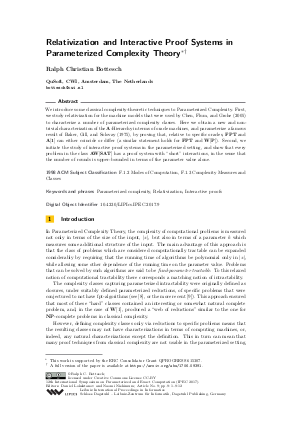Relativization and Interactive Proof Systems in Parameterized Complexity Theory
Author Ralph Bottesch
-
Part of:
Volume:
12th International Symposium on Parameterized and Exact Computation (IPEC 2017)
Part of: Series: Leibniz International Proceedings in Informatics (LIPIcs)
Part of: Conference: International Symposium on Parameterized and Exact Computation (IPEC) - License:
 Creative Commons Attribution 3.0 Unported license
Creative Commons Attribution 3.0 Unported license
- Publication Date: 2018-03-02
File

PDF
LIPIcs.IPEC.2017.9.pdf
- Filesize: 0.52 MB
- 12 pages
Document Identifiers
Subject Classification
Keywords
- Parameterized complexity
- Relativization
- Interactive Proof Systems
Metrics
- Access Statistics
-
Total Accesses (updated on a weekly basis)
0Document
0Metadata
Abstract
We introduce some classical complexity-theoretic techniques to Parameterized Complexity. First, we study relativization for the machine models that were used by Chen, Flum, and Grohe (2005) to characterize a number of parameterized complexity classes. Here we obtain a new and non-trivial characterization of the A-Hierarchy in terms of oracle machines, and parameterize a famous result of Baker, Gill, and Solovay (1975), by proving that, relative to specific oracles, FPT and A[1] can either coincide or differ (a similar statement holds for FPT and W[P]). Second, we initiate the study of interactive proof systems in the parameterized setting, and show that every problem in the class AW[SAT] has a proof system with "short" interactions, in the sense that the number of rounds is upper-bounded in terms of the parameter value alone.
Cite As Get BibTex
Ralph Bottesch. Relativization and Interactive Proof Systems in Parameterized Complexity Theory. In 12th International Symposium on Parameterized and Exact Computation (IPEC 2017). Leibniz International Proceedings in Informatics (LIPIcs), Volume 89, pp. 9:1-9:12, Schloss Dagstuhl – Leibniz-Zentrum für Informatik (2018)
https://doi.org/10.4230/LIPIcs.IPEC.2017.9
BibTex
@InProceedings{bottesch:LIPIcs.IPEC.2017.9,
author = {Bottesch, Ralph},
title = {{Relativization and Interactive Proof Systems in Parameterized Complexity Theory}},
booktitle = {12th International Symposium on Parameterized and Exact Computation (IPEC 2017)},
pages = {9:1--9:12},
series = {Leibniz International Proceedings in Informatics (LIPIcs)},
ISBN = {978-3-95977-051-4},
ISSN = {1868-8969},
year = {2018},
volume = {89},
editor = {Lokshtanov, Daniel and Nishimura, Naomi},
publisher = {Schloss Dagstuhl -- Leibniz-Zentrum f{\"u}r Informatik},
address = {Dagstuhl, Germany},
URL = {https://drops.dagstuhl.de/entities/document/10.4230/LIPIcs.IPEC.2017.9},
URN = {urn:nbn:de:0030-drops-85715},
doi = {10.4230/LIPIcs.IPEC.2017.9},
annote = {Keywords: Parameterized complexity, Relativization, Interactive Proof Systems}
}
Author Details
References
-
S. Aaronson and A. Wigderson. Algebrization: A new barrier in complexity theory. ACM Trans. Comput. Theory, 1(1), 2009.

-
K.A. Abrahamson, R.G. Downey, and M.R. Fellows. Fixed-parameter tractability and completeness IV: On completeness for W[P] and PSPACE analogs. Annals of Pure and Applied Logic, 73:235-276, 1995.

-
S. Arora and B. Barak. Computational Complexity: A Modern Approach. Cambridge, 2009.

-
T. Baker, J. Gill, and R. Solovay. Relativizations of the P=?NP question. SIAM J. Comput., 4(4):431-442, 1975.

-
Y. Chen and J. Flum. Machine characterizations of the classes of the W-hierarchy. Proceedings of the 17th International Workshop on Computer Science Logic, Lecture Notes in Computer Science, 2803:114-127, 2003.

-
Y. Chen, J. Flum, and M. Grohe. Bounded nondeterminism and alternation in parameterized complexity theory. Proceedings of the 18th IEEE Conference on Computational Complexity, pages 13-29, 2003.

-
Y. Chen, J. Flum, and M. Grohe. Machine-based methods in parameterized complexity theory. Theor. Comput. Sci., 339:167-199, 2005.

-
R.G. Downey and M.R. Fellows. Parameterized Complexity. Springer, Berlin, 1999.

-
R.G. Downey and M.R. Fellows. Fundamentals of Parameterized Complexity. Springer, 2013.

-
J. Flum and M. Grohe. Fixed-parameter tractability, definability, and model checking. SIAM J. Comput., 31(1):113-145, 2001.

-
J. Flum and M. Grohe. Parameterized Complexity Theory. Springer, Berlin, 2006.

-
L. Fortnow. A simple proof of Toda’s theorem. Theory of Computing, 5:135-140, 2009.

-
J.A. Montoya and M. Müller. Parameterized random complexity. Theory. Comput. Syst., 52:221-270, 2013.

-
C.H. Papadimitriou. Computational Complexity. Addison-Wesley, 1994.

-
A. Shamir. IP = PSPACE. J. ACM, 39(4):869-877, 1992.

-
A. Shen. IP = PSPACE: simplified proof. J. ACM, 39(4):878-880, 1992.

-
S. Toda. PP is as hard as the polynomial-time hierarchy. SIAM J. Comput., 20(5):865-877, 1991.

